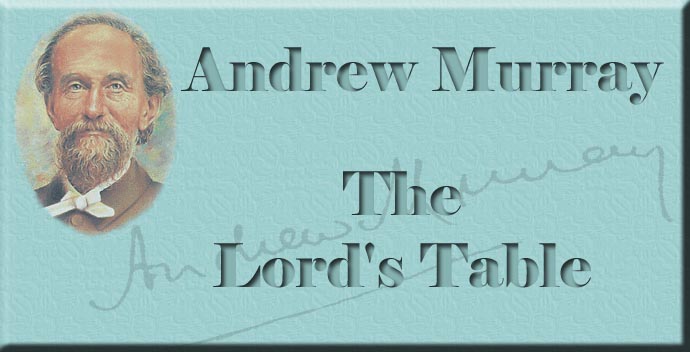 hroughout
the preceding pages the author
makes such pointed reference to
the statements of the Directory
of Public Worship in the Dutch
Reformed Church that bear on
preparation for the Lord's
Supper, and also to the relevant
questions of the Heidelberg
Catechism, that it has been
thought of advantage to the
reader to have these passages
before him. hroughout
the preceding pages the author
makes such pointed reference to
the statements of the Directory
of Public Worship in the Dutch
Reformed Church that bear on
preparation for the Lord's
Supper, and also to the relevant
questions of the Heidelberg
Catechism, that it has been
thought of advantage to the
reader to have these passages
before him.
I. Self-Examination
"True proving of ourselves consists of three parts:–
"1. In the first place, let everyone in his own heart reflect on his sin
and condemnation, in order that he may loathe himself and humble himself
before God: seeing that the wrath of God against sin is so great that,
rather than suffer it to remain unpunished, He punished it in His dear
Son Jesus Christ, in the bitter and ignominous death of the Cross.
"2. In the second place, let everyone examine his heart as to whether he
also believes this sure promise of God, that only on the ground of the
suffering and death of Jesus Christ all his sins are forgiven him, and
the perfect righteousness of Christ is bestowed upon him and imputed to
him as his own: yea, as completely as if he himself in his own person
had atoned for all his sins and performed all righteousness.
"3. In the third place, let everyone examine his conscience as to whether
he is prepared, henceforth and with his whole life, to manifest true
thankfulness toward God the Lord, and to walk uprightly in God's sight.
"All who are so disposed, God will assuredly receive into His favor, and
regard as worthy communicants at the table of His Son Jesus Christ. On
the other hand, those that have no such testimony in their hearts, eat
and drink judgment to themselves."
.
II. Christ in the Supper
"Question 76. What is meant by eating the crucified body and drinking the
shed blood of Christ?
"Answer. It is not only to receive with a believing heart the whole
suffering and dying of Christ, and thereby to obtain the forgiveness of
sins and life eternal, but moreover, also, to be so united more and more
to His sacred body by the Holy Ghost, who dwells both in Christ and in
us, that although He is in Heaven and we are upon the earth, we are
nevertheless flesh of His flesh and bone of His bones, and live and are
governed forever by One Spirit, as the members of one body are by one
soul.
"Question 79. Why, then, doth Christ call the bread His body and the cup
His blood, or the New Testament in His blood; and St. Paul, the
communion of the body and blood of Christ?
"Answer. Christ speaks thus not without great cause, namely, not only that
He may thereby teach us that like as bread and wine sustain this
temporal life, so also His crucified body and shed blood are the true
meat and drink of our souls unto eternal life; but, much more that by
this visible sign and pledge He may assure us that we are as really
partakers of His true body and blood, through the working of the Holy
Spirit, as with the bodily mouth we receive these holy tokens in
remembrance of Him; and that all His suffering and obedience are as
surely our own as if we ourselves in our own person had suffered all and
done enough."
|

 hroughout
the preceding pages the author
makes such pointed reference to
the statements of the Directory
of Public Worship in the Dutch
Reformed Church that bear on
preparation for the Lord's
Supper, and also to the relevant
questions of the Heidelberg
Catechism, that it has been
thought of advantage to the
reader to have these passages
before him.
hroughout
the preceding pages the author
makes such pointed reference to
the statements of the Directory
of Public Worship in the Dutch
Reformed Church that bear on
preparation for the Lord's
Supper, and also to the relevant
questions of the Heidelberg
Catechism, that it has been
thought of advantage to the
reader to have these passages
before him.

 Home
Home What's New
What's New Bible
Bible Photos
Photos Hiking
Hiking E-Books
E-Books Genealogy
Genealogy Profile
Free Plug-ins You May Need
Profile
Free Plug-ins You May Need
 Get
Java
Get
Java.png) Get Flash
Get Flash Get
7-Zip
Get
7-Zip Get Acrobat Reader
Get Acrobat Reader Get
TheWORD
Get
TheWORD